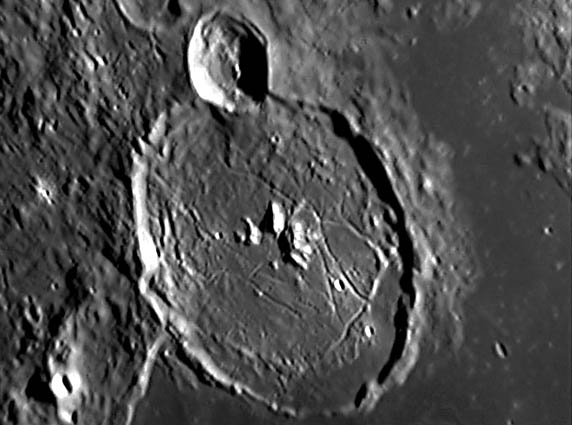Difference between revisions of "February 26, 2005"
| Line 3: | Line 3: | ||
<table width="85%" border="0" align="center" cellpadding="6" cellspacing="2"> | <table width="85%" border="0" align="center" cellpadding="6" cellspacing="2"> | ||
<tr> | <tr> | ||
| − | |||
</tr> | </tr> | ||
</table> | </table> | ||
| Line 21: | Line 20: | ||
<p align="center"><b>A Warhorse, Again</b></p> | <p align="center"><b>A Warhorse, Again</b></p> | ||
<p align="left">At classical music radio stations (a dying breed), program directors refer to <i>The 1812 Overture, Beethoven’s 9th symphony, Capriccio Italian</i>, and similar popular classics as <i>warhorses</i>. These very well known compositions are guaranteed crowd pleasers, but playing them reduces opportunities to hear other interesting, but less famous music. If the Moon has warhorses, they include Copernicus, Plato, Clavius, Tycho and Gassendi. But another wonderful image of Gassendi shares the same virtue of a great rendition of a musical warhorse – it exhibits new appreciation for the details and subtleties of an old friend. This image nicely illustrates the complex system of rilles, but let’s looks at what is left of the inner wall. Unlike a large fresh crater with massive terraces stepping down to the floor, Gassendi’s walls – where they exist - have subdued and rounded ridges and hills. How do sharp-scarped terraces get so ruined? Is it from seismic jostling from subsequent impacts, both nearby and Moon-wide? Or is it from the constant barrage of very small impacts that act like a river’s erosion, slowly rounding and carrying away asperities? I think I favor the former view because although Gassendi’s walls are heavily modified, its central peaks seem much less so. And there is direct evidence of the effects of nearby impacts. Notice the 33 km wide Gassendi A that just breaks Gassendi’s northern rim. Look how A’s impact has dislodged and smoothed a broad portion of Gassendi’s inner wall. That was an instantaneous bit of terrace ageing!</p> | <p align="left">At classical music radio stations (a dying breed), program directors refer to <i>The 1812 Overture, Beethoven’s 9th symphony, Capriccio Italian</i>, and similar popular classics as <i>warhorses</i>. These very well known compositions are guaranteed crowd pleasers, but playing them reduces opportunities to hear other interesting, but less famous music. If the Moon has warhorses, they include Copernicus, Plato, Clavius, Tycho and Gassendi. But another wonderful image of Gassendi shares the same virtue of a great rendition of a musical warhorse – it exhibits new appreciation for the details and subtleties of an old friend. This image nicely illustrates the complex system of rilles, but let’s looks at what is left of the inner wall. Unlike a large fresh crater with massive terraces stepping down to the floor, Gassendi’s walls – where they exist - have subdued and rounded ridges and hills. How do sharp-scarped terraces get so ruined? Is it from seismic jostling from subsequent impacts, both nearby and Moon-wide? Or is it from the constant barrage of very small impacts that act like a river’s erosion, slowly rounding and carrying away asperities? I think I favor the former view because although Gassendi’s walls are heavily modified, its central peaks seem much less so. And there is direct evidence of the effects of nearby impacts. Notice the 33 km wide Gassendi A that just breaks Gassendi’s northern rim. Look how A’s impact has dislodged and smoothed a broad portion of Gassendi’s inner wall. That was an instantaneous bit of terrace ageing!</p> | ||
| − | <blockquote><p align="right">— [mailto:tychocrater@yahoo.com Chuck Wood]</blockquote> | + | <blockquote> |
| − | <p align="left" | + | <p align="right">— [mailto:tychocrater@yahoo.com Chuck Wood]</blockquote> |
| + | <p align="left"><b>Technical Details:</b><br> | ||
C11 + 3X Televue Barlow + ATK-2HS; 2x150 frames.</p> | C11 + 3X Televue Barlow + ATK-2HS; 2x150 frames.</p> | ||
<p><b>Related Links:</b><br> | <p><b>Related Links:</b><br> | ||
Revision as of 18:18, 17 January 2015
A Warhorse, Again
Image Credit: Richard Bosman
|
|
A Warhorse, Again At classical music radio stations (a dying breed), program directors refer to The 1812 Overture, Beethoven’s 9th symphony, Capriccio Italian, and similar popular classics as warhorses. These very well known compositions are guaranteed crowd pleasers, but playing them reduces opportunities to hear other interesting, but less famous music. If the Moon has warhorses, they include Copernicus, Plato, Clavius, Tycho and Gassendi. But another wonderful image of Gassendi shares the same virtue of a great rendition of a musical warhorse – it exhibits new appreciation for the details and subtleties of an old friend. This image nicely illustrates the complex system of rilles, but let’s looks at what is left of the inner wall. Unlike a large fresh crater with massive terraces stepping down to the floor, Gassendi’s walls – where they exist - have subdued and rounded ridges and hills. How do sharp-scarped terraces get so ruined? Is it from seismic jostling from subsequent impacts, both nearby and Moon-wide? Or is it from the constant barrage of very small impacts that act like a river’s erosion, slowly rounding and carrying away asperities? I think I favor the former view because although Gassendi’s walls are heavily modified, its central peaks seem much less so. And there is direct evidence of the effects of nearby impacts. Notice the 33 km wide Gassendi A that just breaks Gassendi’s northern rim. Look how A’s impact has dislodged and smoothed a broad portion of Gassendi’s inner wall. That was an instantaneous bit of terrace ageing! Technical Details: Related Links: Tomorrow's LPOD: One Crater’s Nomenclature |
|
Author & Editor: Technical Consultant: Contact Translator: A service of: |
COMMENTS?
Register, and click on the Discussion tab at the top of the page.




